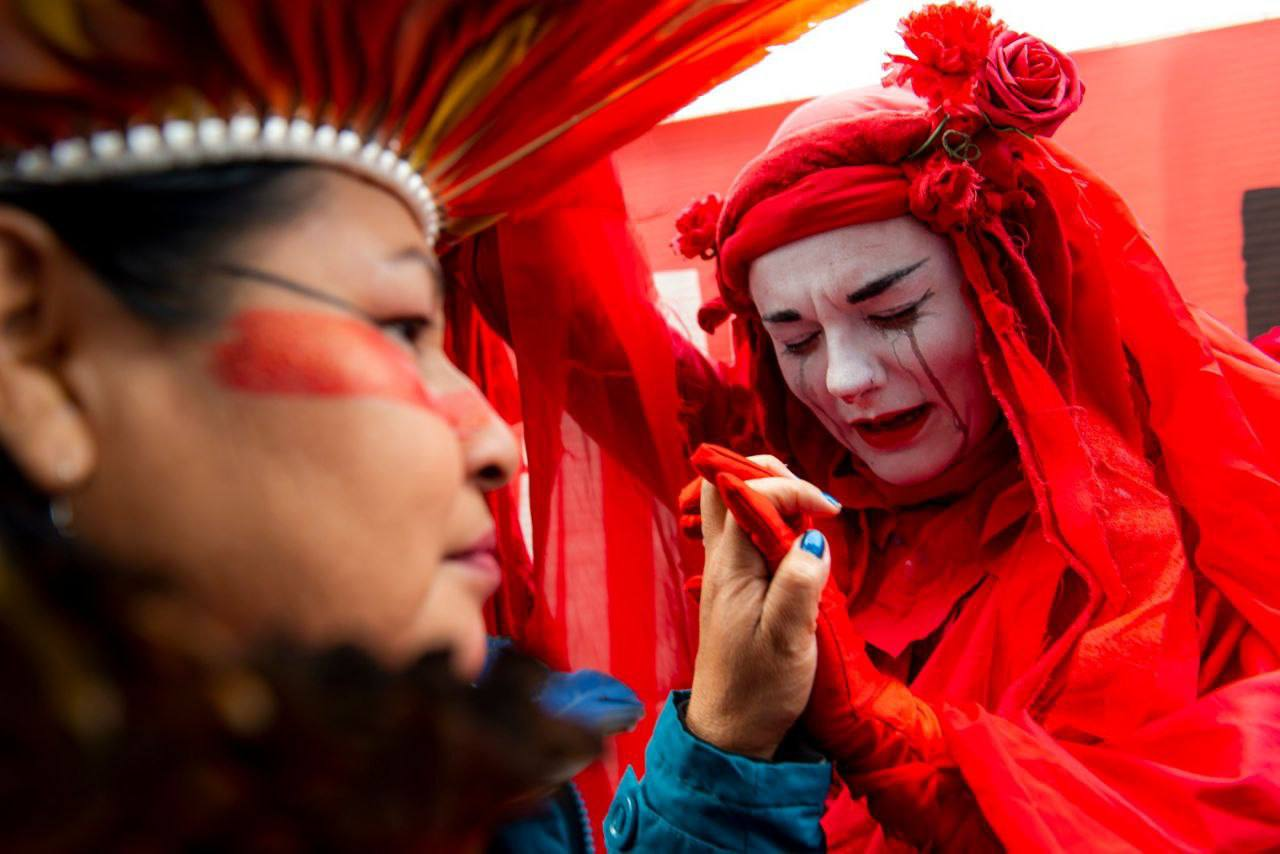
An indigenous woman comforts a weeping Red Rebel in Glasgow during COP26.
In this issue: DRC Rebels | Nigeria Rebels | Ecuador Rebels | Glasgow COP Rebellion
Introduction
Dear rebel,
After all the fanfare, COP26 has failed. Not one of the G20 nations, the richest and most culpable for this crisis, will cut emissions to keep global heating even close to 1.5C.
Global South nations have not been given the promised funds to rebuild from and defend against the extreme weather that already devastates their lands and people.
Fossil fuel infrastructure will continue to expand and governments will continue to rig markets to encourage it.
On all fronts, yet again, the can has been kicked down the road. Next year, we are promised, will be different. Next year real progress will be made.
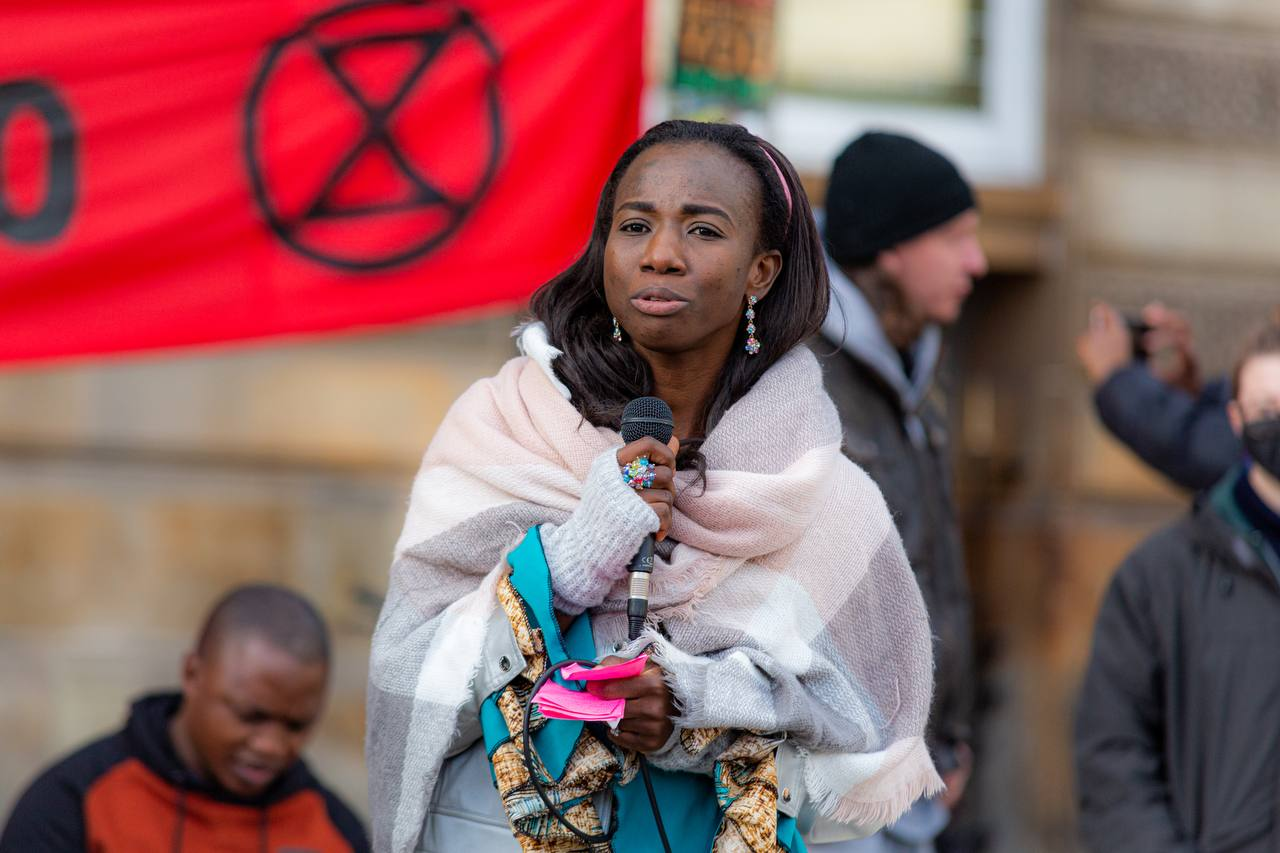
A Nigerian activist in Glasgow talks about how oil drilling has destroyed Africa for decades.
Half a world away, another convention that will define our climate has also just finished. But this one, held in Cape Town, has been a roaring success.
Africa Energy Week is a networking event designed to accelerate deals between regional governments and global fossil fuel companies. Africa is full of untapped oil and gas reserves. Contracts are being signed and vast infrastructure is being built to get it.
African governments need to bring their people out of fuel poverty. Agreements should be in place to push renewables, and compensate them for keeping their fossil fuels in the ground. Instead, the fossil fuel industry sent more delegates to COP than any country, escaped binding restrictions, and is free to plunder, pollute, and profit as usual.

Rebels march through the city of Butembo, DRC, to stop Virunga Park being drilled for oil.
African rebels are bravely trying to push back against this suicidal system. In Action Highlights you can read about protests across the DRC, Nigeria, and Sierra Leone. You can also find out how unfettered extractivism is causing ecocide and genocide in Ecuador and Brazil.
Despite hosting another week of beautiful COP26 actions that championed Global South activists, Scottish rebels are angry. Understand why in COP Action Highlights.
Our last issue was so stuffed with Global South action that we had technical problems sending it out. To those who received it twice, apologies. To those who never read it at all, why not check your junk mail folder, or read it on our website.
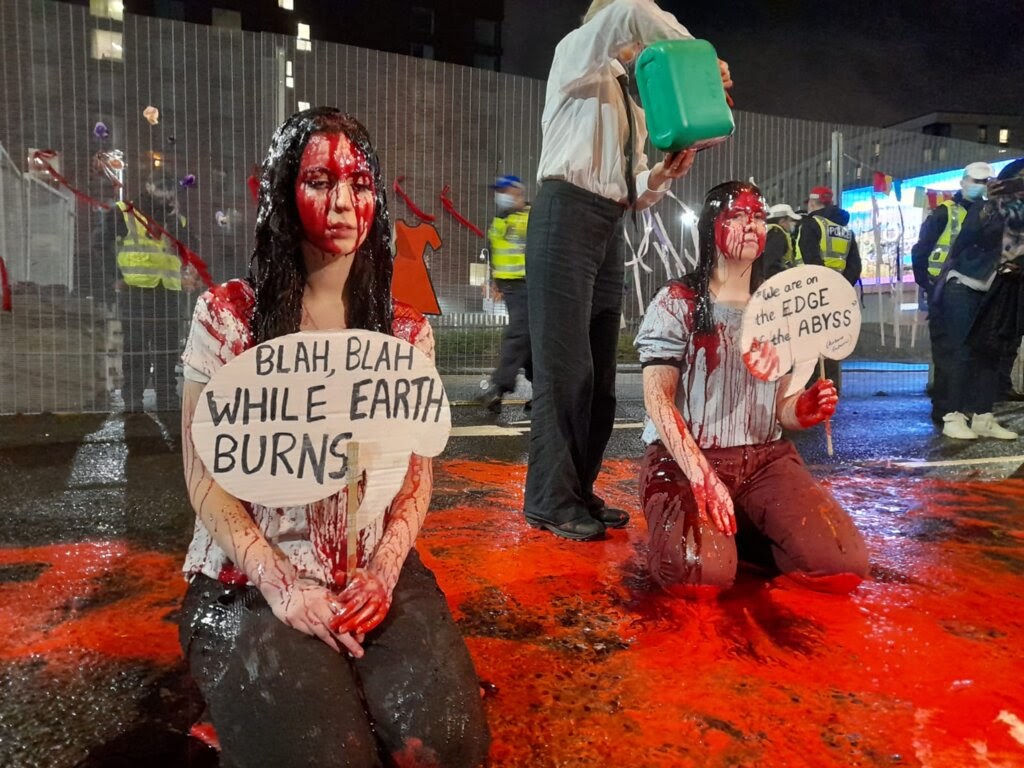
Blood spills outside the Blue Zone on the last day of COP26. Photo: Max Withey
The rallying cry of COP26 was to keep 1.5 alive. But the G20 leaders have left it to die, and instead breathed new life into the fossil fuel industry. The human cost of their negligence is terrifying to contemplate.
These so-called leaders do not just have blood on their hands, they have it up to their waists. They wade through it.
If they are not stopped, they will drown in it. For the good of all life, we must somehow wrestle power away from them.
Get involved in XR wherever you are! Check out our global website, learn more about our movement, and connect with rebels in your local area.
The Global Newsletter is brought to you by XR Global Support, a worldwide network of rebels who help new XR chapters grow. Read previous issues here.
We are in a crucial phase of human history, and we need money to make our message heard. Anything you can give is appreciated.
Contents
- Global South Action Highlights: DRC, Nigeria, Ecuador, Brazil, Sierra Leone
- COP Action Highlights: The Final Week of COP26 Rebellion in Glasgow.
- Action Roundup: Senegal, Norway, The Gambia, Tanzania, Germany, Cameroon, Bangladesh, Italy, Australia, UK, USA, Finland.
- Humans of XR: Babu, The Gambia.
Global South Action Highlights
XR DRC: ‘Stop Killing Us!’
4 - 10 NOV | North and South Kivu, DRC
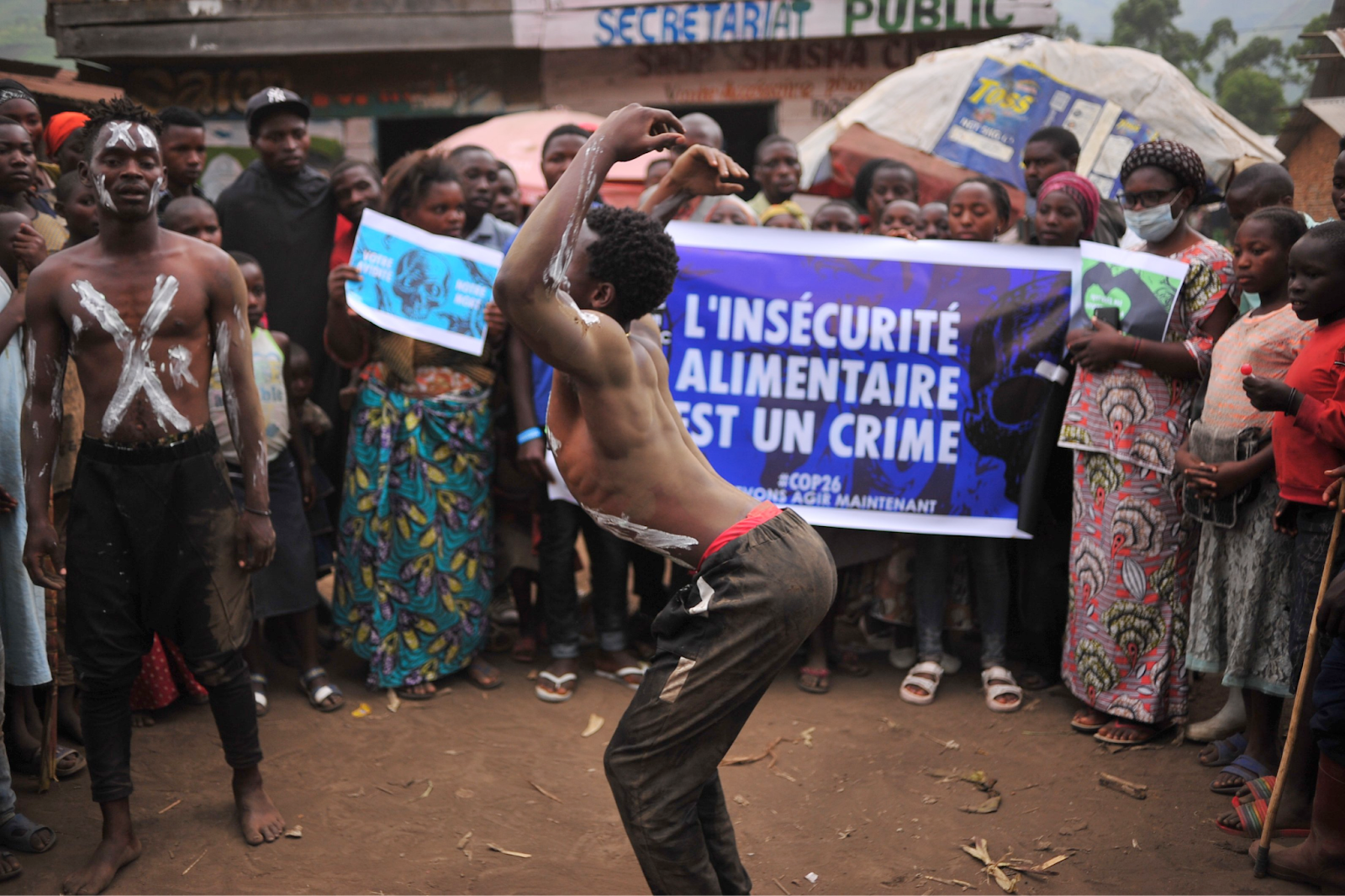
Rebels dance in a market in Shasha to highlight the issue of food insecurity.
While world leaders met at COP26, rebels across the DRC demonstrated in food markets, outside mining companies, in areas affected by deforestation, and in villages abandoned after floods and landslides.
Across the provinces of North and South Kivu, rebels headed to local markets to increase awareness about how the climate crisis threatens food production. Food insecurity already affects over 26 million people in the DRC.
One major cause of food insecurity in the DRC is deforestation. Worryingly, recent estimates suggest that deforestation of the Congo Basin - the second-largest rainforest in the world, and a key CO² captor – is accelerating.
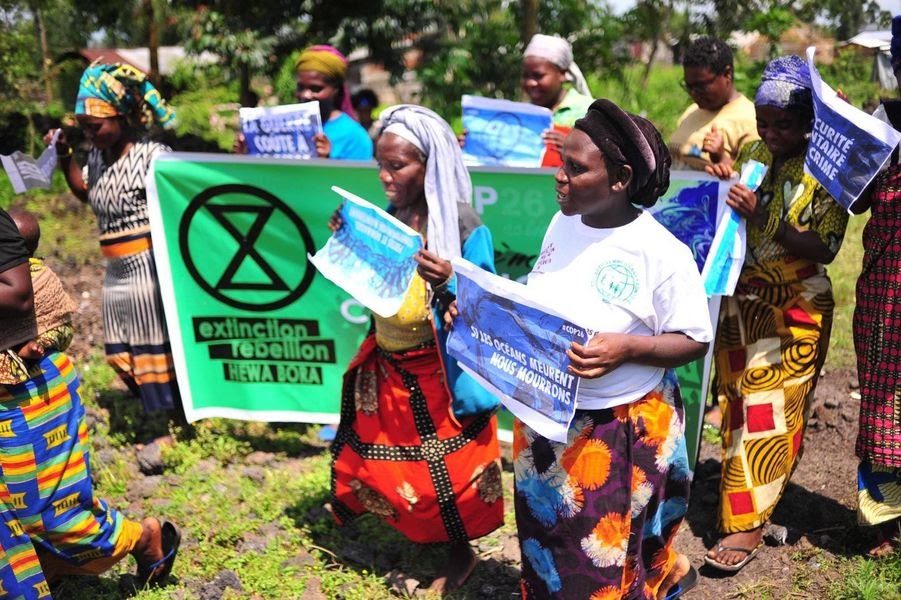
XR Hewa Bora calls for recognition of the communities displaced by deforestation.
XR Hewa Bora, formed by a group of displaced Bambuti hunter-gatherers, have first-hand experience of the impact of deforestation. Demonstrating near the old Mugunga Refugee Camp in North Kivu, they drew attention to the communities who have been forced from their forest homes by agriculture, mining and logging.
Rebels in the same region also staged protests in villages abandoned due to flooding. Torrential rains have caused repeated flooding and landslides across the country, and more than 44,000 people were displaced in just the first half of 2021 alone. The rebels’ message to the leaders of COP26: Stop killing us!
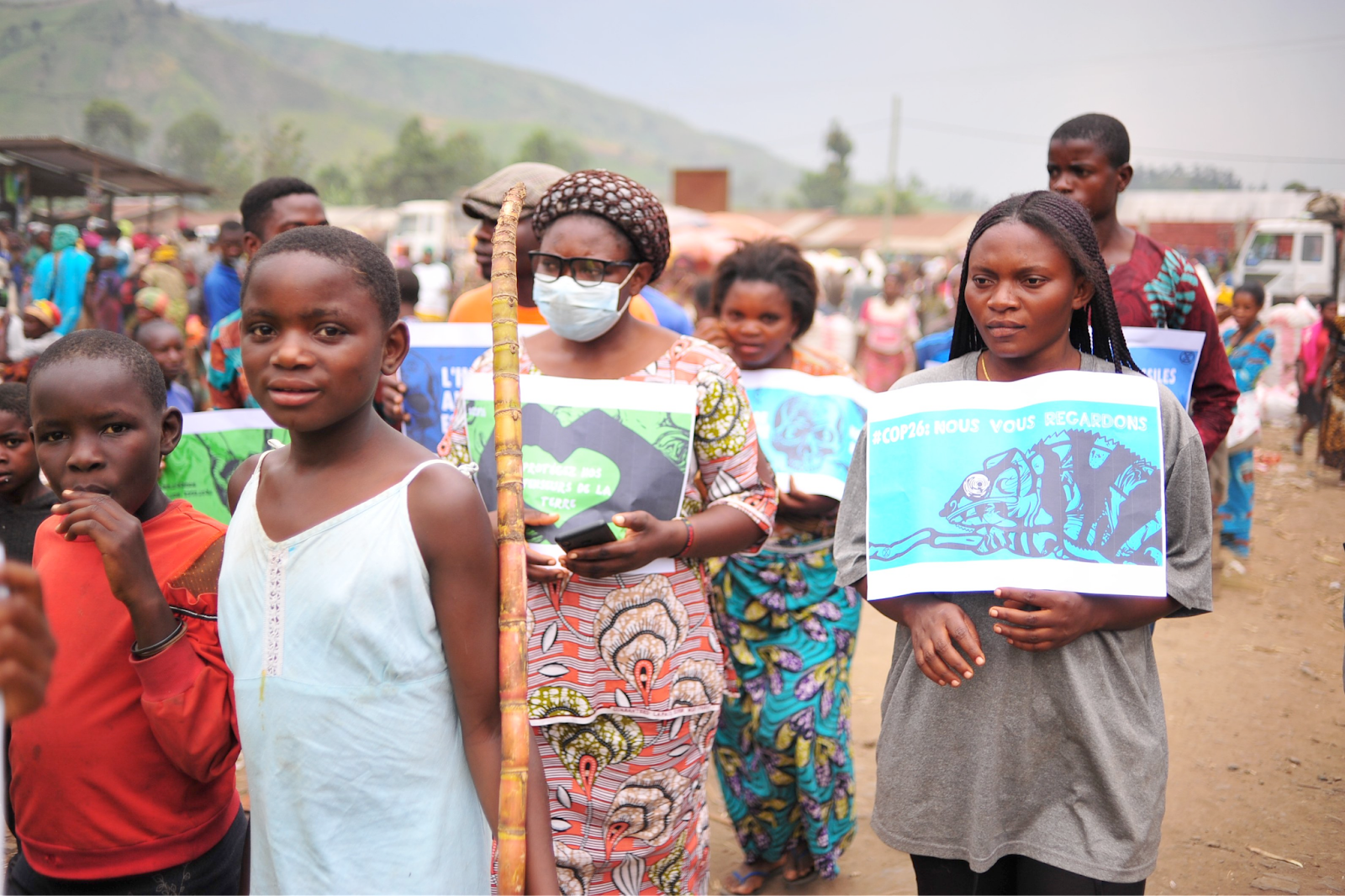
Rebels in Shasha demand a local mining company does more to protect the environment.
There were rallies against fossil fuels in two major cities that border Virunga National Park - a World Heritage Site that has long been coveted by oil companies. Rebels in Goma and Butembo demanded that the government cancel licenses for oil extraction.
The park is one of the most biologically diverse areas in the world, and has drawn in armed militias, poachers and corrupt officials as oil companies like Total have lobbied to drill there. At least 200 park rangers have been murdered in the decade-long struggle.
XR DRC intends to keep mobilizing local communities who are being directly impacted by the climate crisis, and to keep calling their own government, as well as the industrialized countries who have caused this crisis, to account.
Nigeria Makes Some Noise
27 OCT - 10 NOV | Nigeria
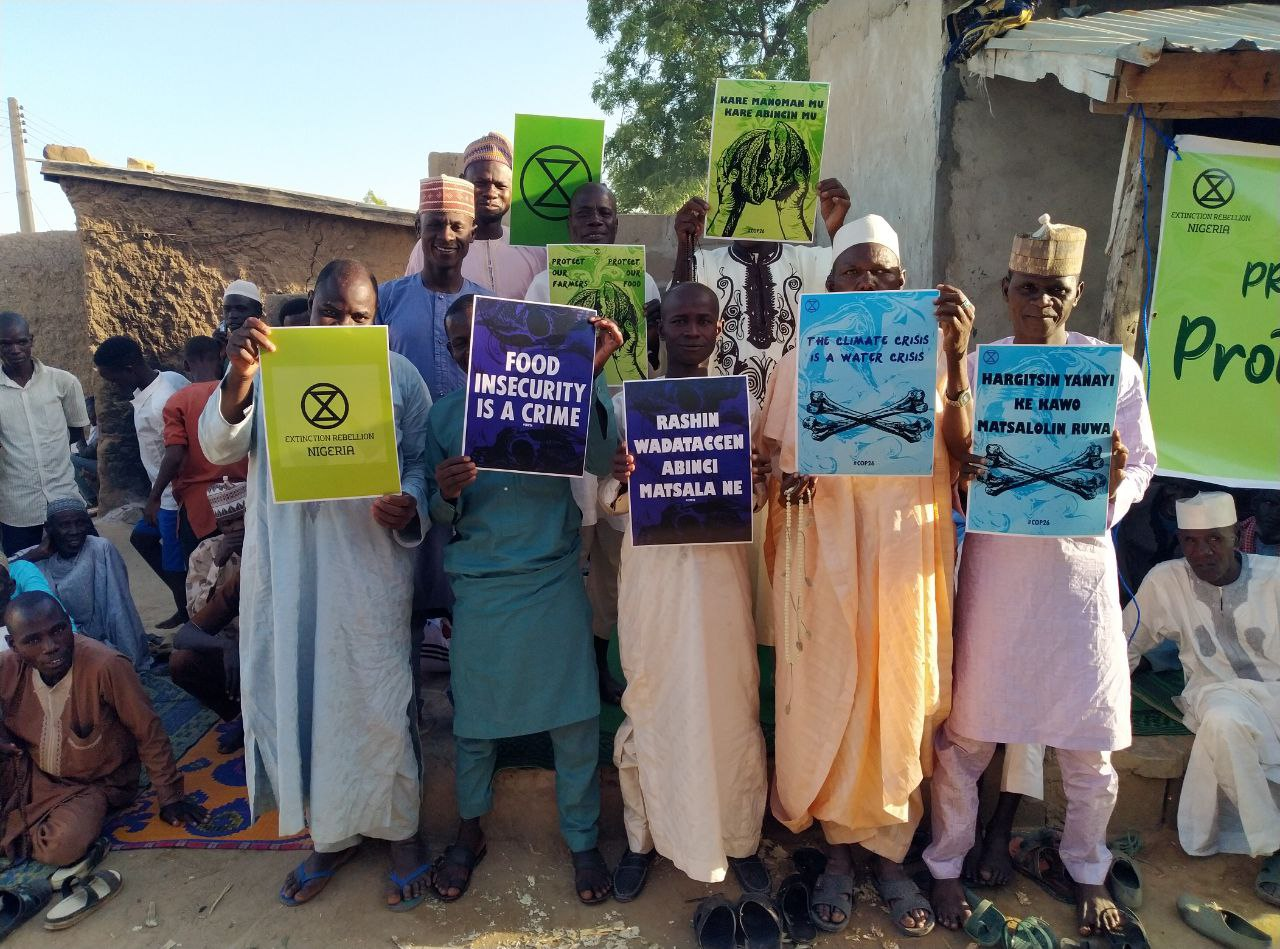
XR Muslims Nigeria hold a workshop with the farmers and fishermen of Tsidir.
A live music concert. A march through town. Interviews with struggling farmers. A meeting with journalists to encourage better reporting of the climate emergency. Nigerian rebels used an array of tactics to make their voices heard during COP26.
Large parts of northern Nigeria are being ravaged by desertification and drought. Communities are moving south in search of clean water and food, causing clashes between roaming cattle herders and farmers, and leaving millions displaced from their ancestral homes.
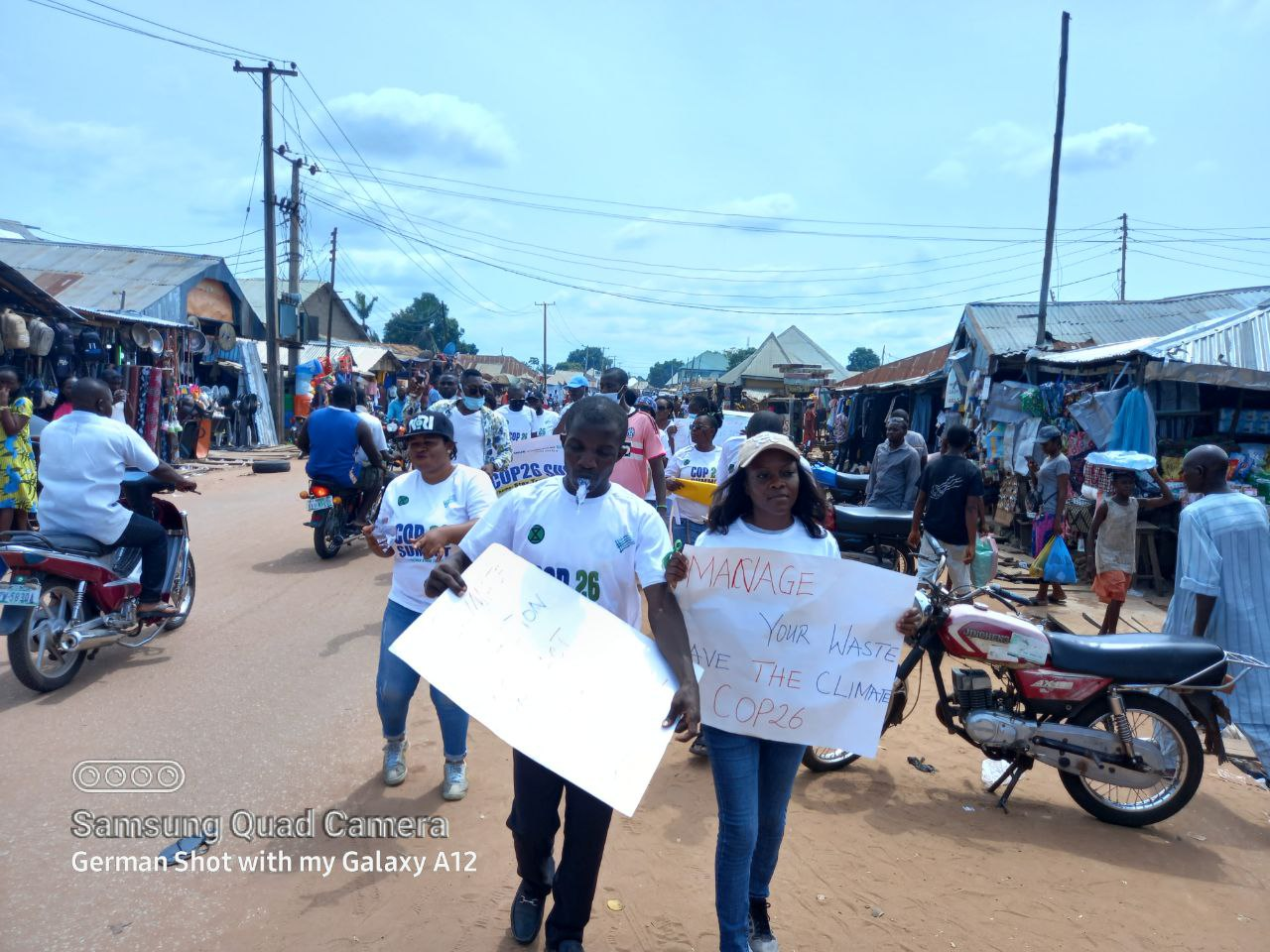
Rebels march (and dance) through Makurdi city to reduce waste and promote recycling.
Meanwhile in the northwestern town of Tsidir, people are suffering from increasing floods. XR Muslims Nigeria gathered farmers and fishermen in the community to discuss the impacts of the chaotic weather and hear their demands of the leaders in Glasgow.
In the northern city of Kaduna, rebels held a roundtable with local journalists to increase their understanding of the climate crisis. They also urged the press to hold the government to account when it came to environmental protections and investments in renewable energy.
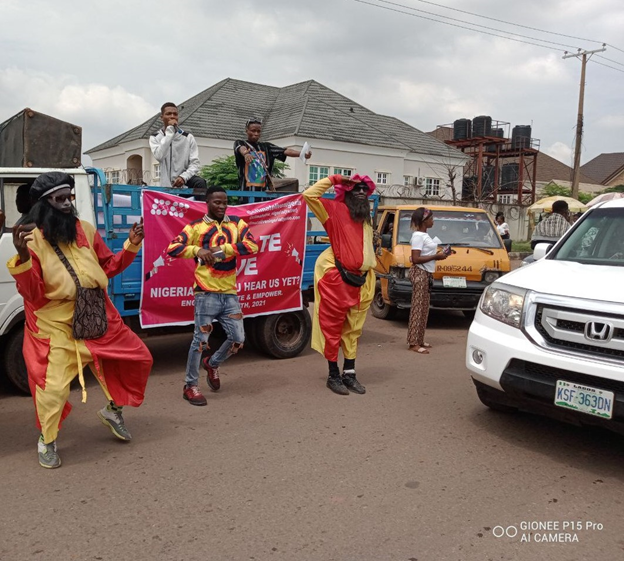
Rebels dance in the streets of ‘Coal City’ to promote a ‘Climate Music Concert’.
Rebels joined with other climate activists in the southeastern city of Enugu (known as the Coal City because of its long history with coal mining) to hold a live street concert featuring upcoming local musicians.
A rebel organizer explained: “we are using the power of music to gather people together, especially young people, to engage them in this global fight for climate justice”.
Rebels in Enugu also set up a community COP26 viewing centre. Locals without internet access could watch the world leaders as they made decisions that will determine Nigeria’s future.
Nurture For Nature In Freetown
6 NOV | Freetown, Sierra Leone
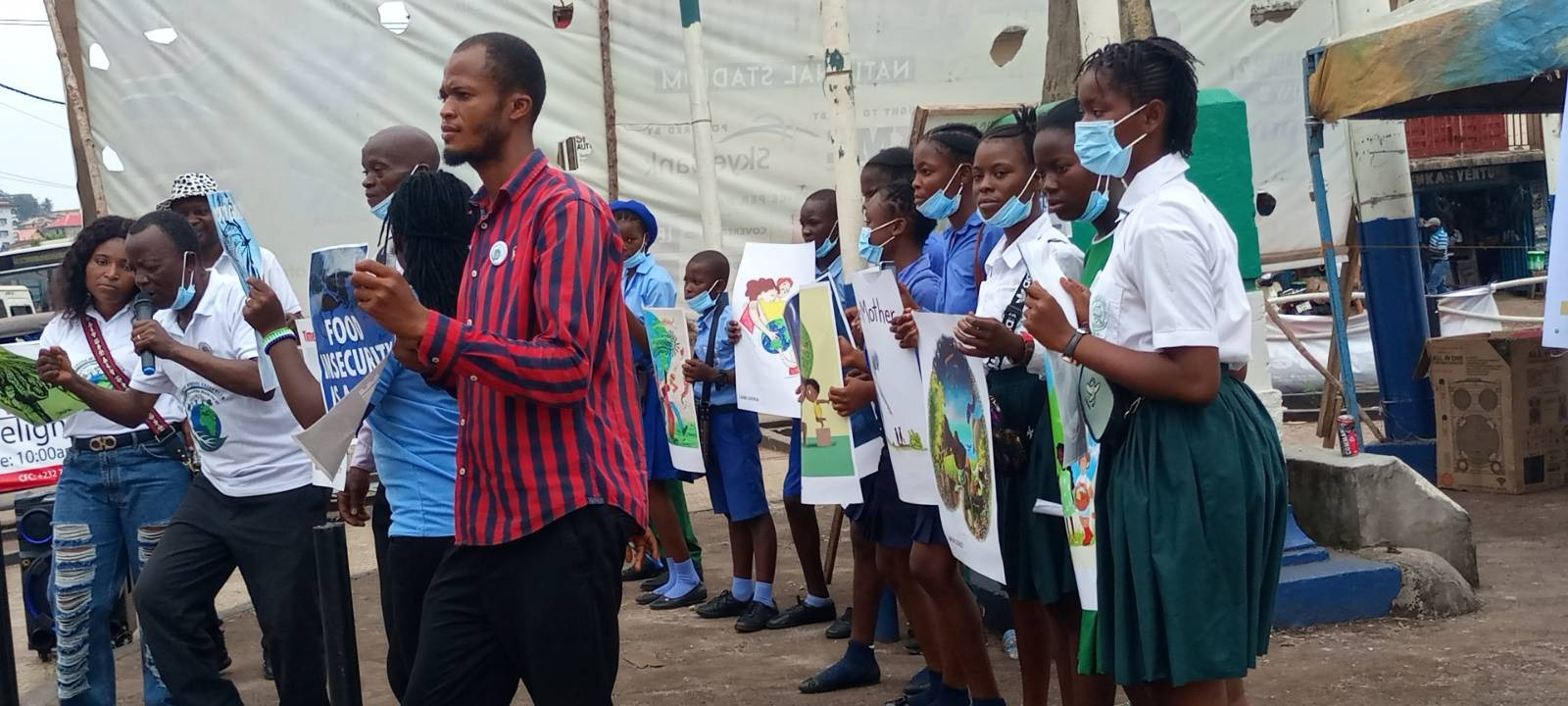
Rebels and school children sing and dance beside a busy junction in Freetown.
Rebels and other local activists blocked off a main junction in Sierra Leone’s capital to demand the reintroduction of a ban on logging, and for the Global North leaders at COP26 to repay the Global South for the egregious costs of their emissions and extractivism.
Rebels and local school children sang songs and danced in front of placards and artwork. They also gave interviews to local media.
The country has long been plagued by logging, as well as diamond and rare-earth metal mining. The land grabbing and pollution from these industries has left many citizens without adequate nutrition, and indigenous wildlife facing extinction.
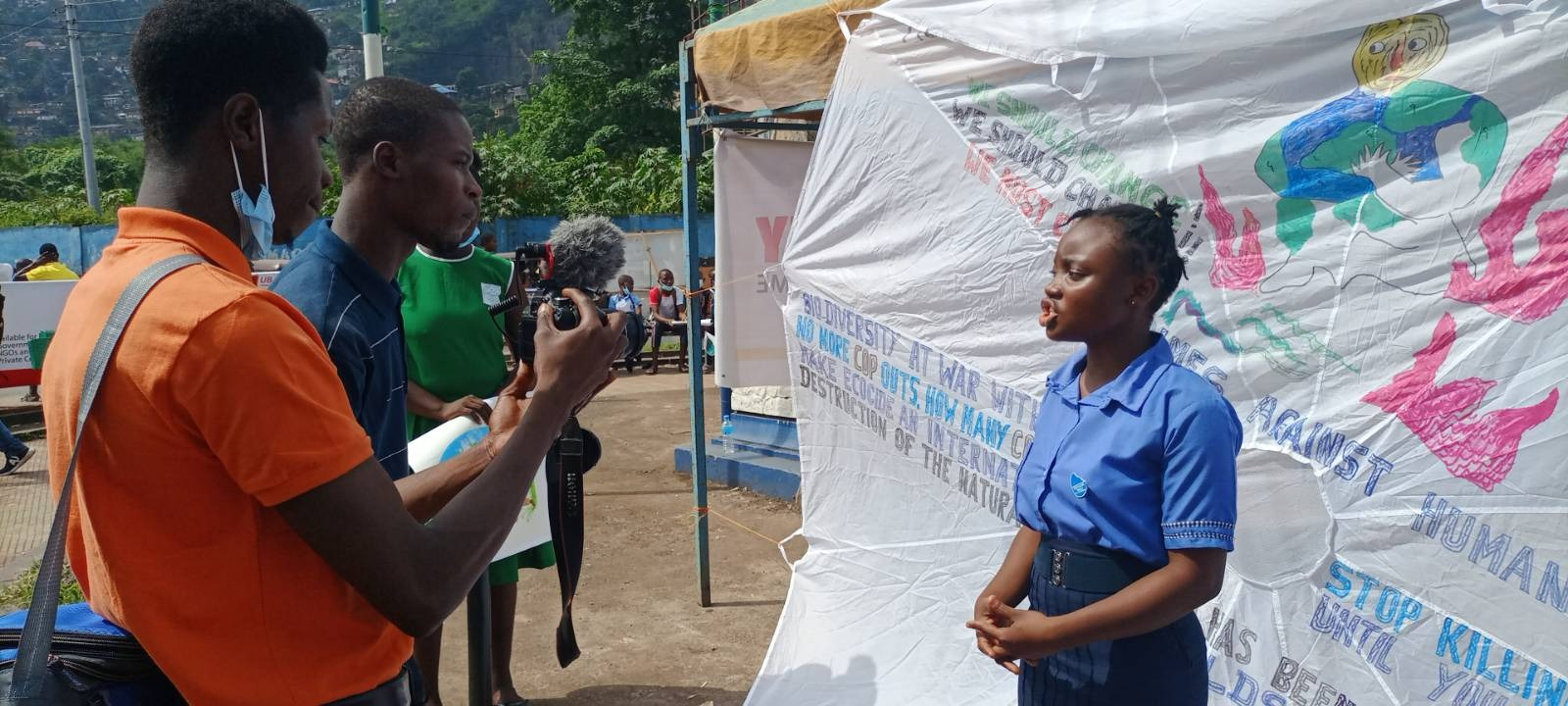
A school girl is interviewed by local media after being part of a rebel rally in Freetown.
A decade-long ban on timber exports was recently lifted by the government to make up for a fall in mining revenues. The nation’s rosewood forests are coveted by China, but slow-growing and still heavily depleted.
XR Sierra Leone is determined to nurture a future generation of climate leaders in the country. It is working with groups like the ‘Sierra Leone School Green Club’ to educate young people about the environment and get climate material into the national curriculum.
End Extractivism & Change Farming says XR Ecuador.
7 & 12 NOV | Quito, Ecuador
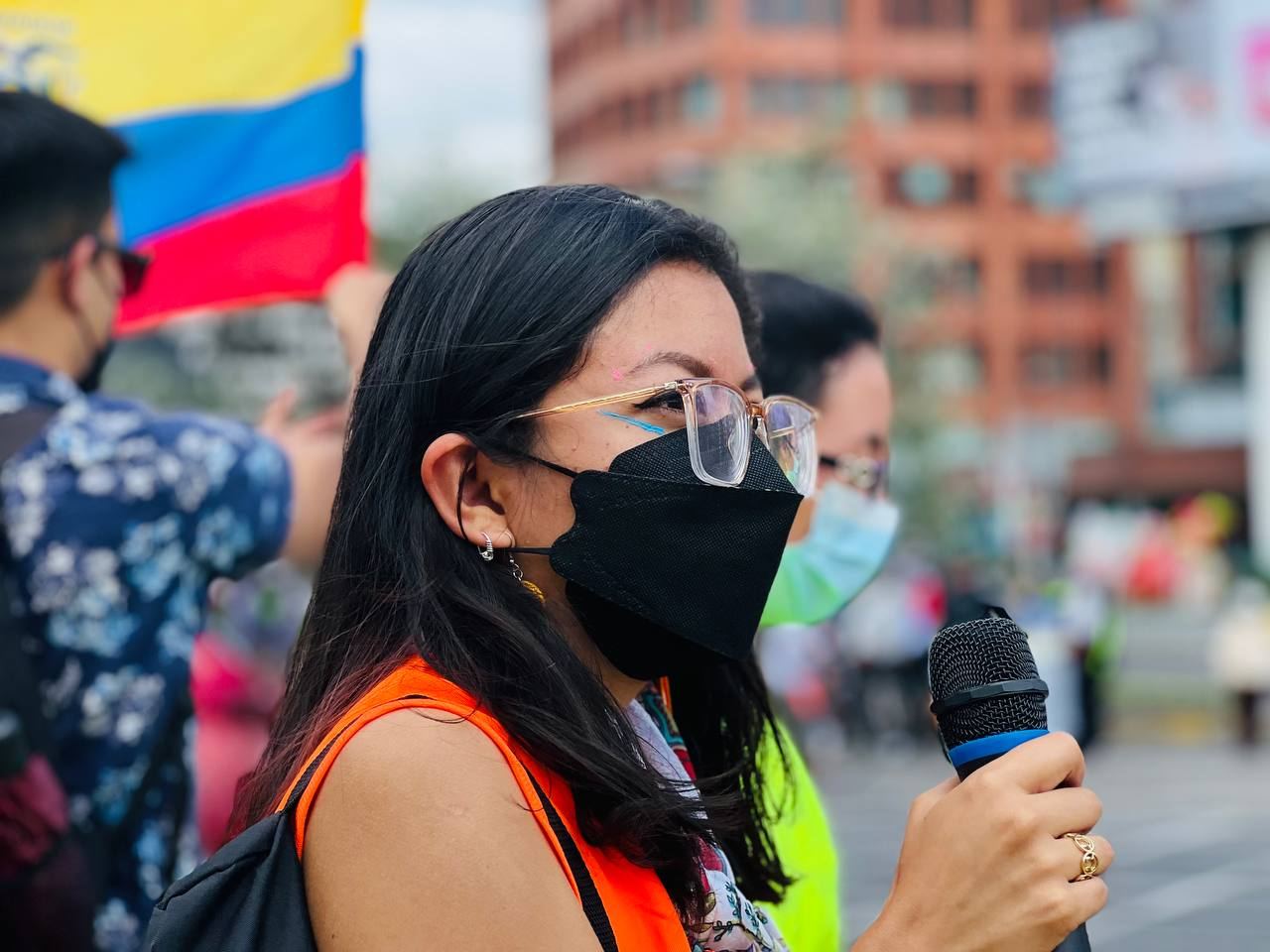
On a busy road of the capital, a rebel talks about how extractivism in Ecuador must end.
XR Ecuador marched down United Nations Avenue in a ‘Fiesta con Conciencia’ (Party with Conscience) to show their disgust at the lack of progress being made at COP26.
Dressed in bright colours and playing loud music throughout, rebels celebrated their country while showing solidarity with a local anti-mining campaign that is trying to halt several mining projects in the area.
They had a simple message for rich countries: “Ecuador is not your petrol station, it is not your mine, it is not your trash bin, it is not your exotic pet shop, it is not your sawmill, it is not your discount shop”.

Rebels present problems and solutions outside the Ministry of Agriculture.
Their next appointment was at the Ministry of Agriculture, where rebels presented five complaints about the farming system in Ecuador, and also offered five solutions.
Problems highlighted included the ecocidal impacts of excessive pesticide use, human rights abuses (including child labour) by the banana industry, deforestation by the soy and palm oil industries, and the polluting of indigenous lands and rivers by World Bank-financed livestock factory farms.
Solutions included subsidies to support agroecological producers and the promotion of the switch to a plant-based diet.
Cattle and Covid Cost The Earth
7 / 12 NOV | São Paulo / Fortaleza, Brazil
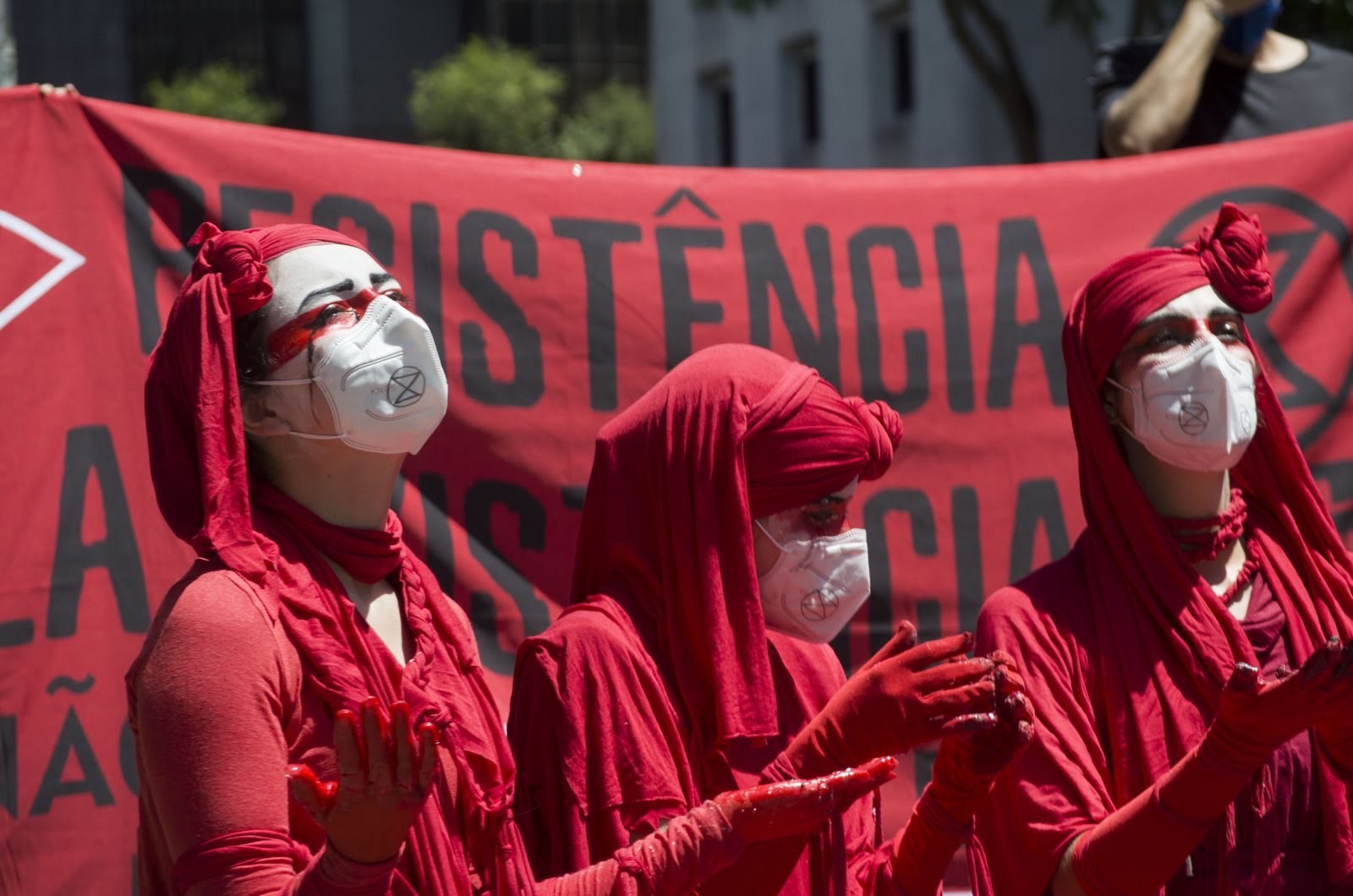
The Red Rebel Carpideiras weep at a funeral for Brazilian biodiversity in Sao Paulo.
Rebels held a theatrical funeral for Brazilian biodiversity in a major road of one of the busiest cities in the world.
Red rebels took on the role of carpideiras (women traditionally hired to cry at funerals) as they poured blood over animal effigies and wept as they ‘buried’ them. Other rebels handed out flyers to bemused passersby about the meat industry.
Cattle ranching is responsible for 80% of the deforestation in the Amazon, and most of the beef it produces is exported to other countries.
Fires used to clear the forest for farming have affected 90% of all species living there, and under Brazil’s current administration these fires are only increasing. The Amazon biome is now emitting more CO2 than it is absorbing.
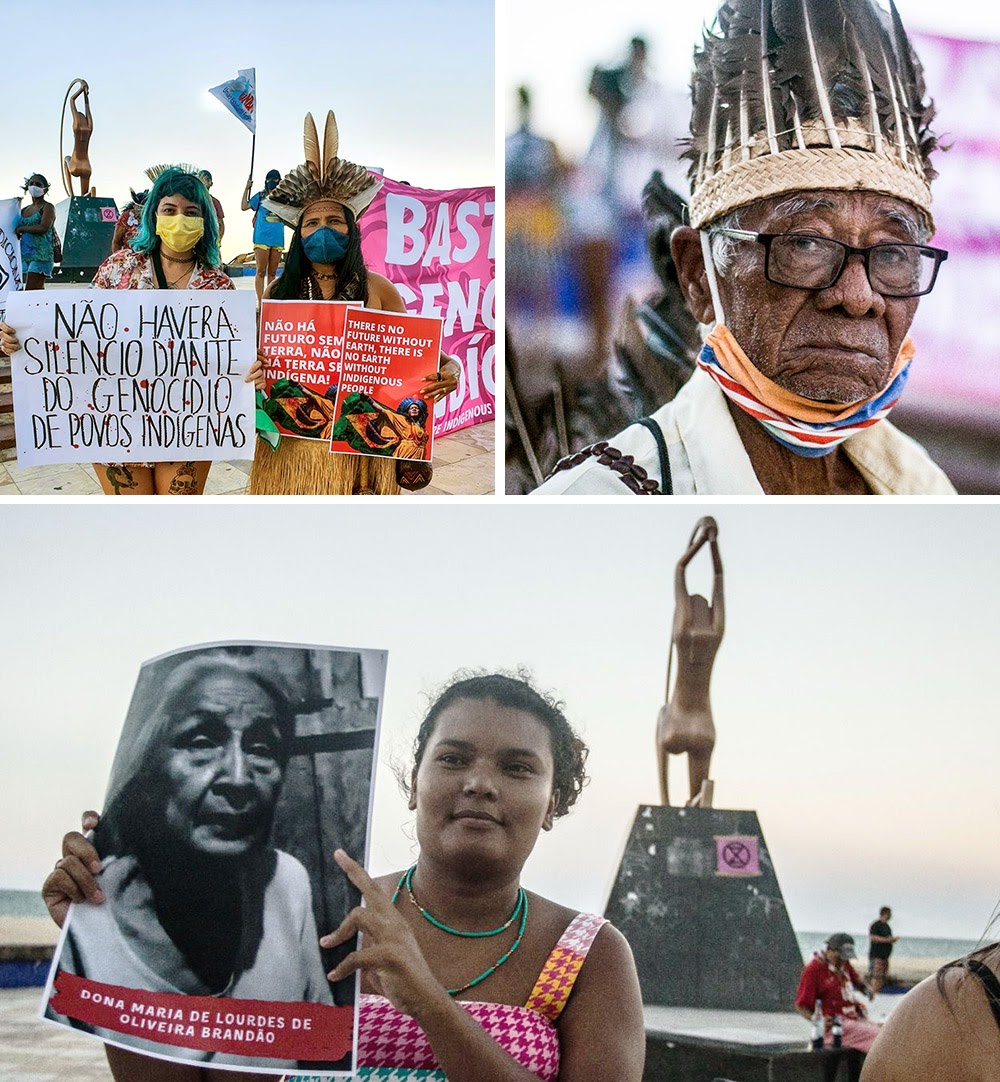
Rebels & indigenous people protest together in Fortaleza and remember those recently lost.
Days later, in the northeastern city of Fortaleza, rebels and indigenous protestors joined for a rally and vigil on a beachfront. Those assembled called for an end to both the genocide of indigenous people and the destruction of their lands.
Portraits were held up of indigenous people recently lost to the coronavirus pandemic. Their names were spoken during a vigil where candles were placed around the Iracema Statue.
COP Action Highlights
XR Scotland to COP: Get Tae Fuck!
7 - 13 NOV | Glasgow, Scotland
COP is over and Scottish rebels are angry. Angry at the conference delegates who chose greenwashing over action. Angry at the heavy-handed policing that left protestors intimidated and actions cancelled when venues were threatened with closure. Angry that the media still grants COP legitimacy after three decades of failure.
To all of them, they say ‘get tae fuck’ (translation: go away).
But to those angry Scottish rebels, we should hold nothing but gratitude. They gave every last ounce of energy, creativity, love and rage to pull off a second week of dazzling actions that brought movements together and amplified those on the frontline of the climate crisis.
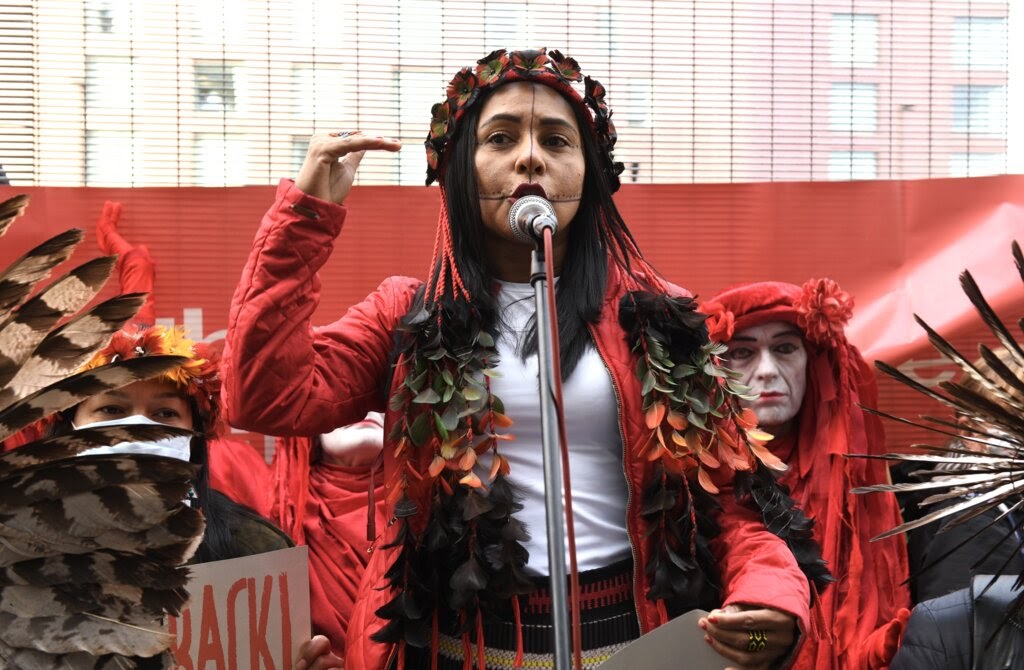
An indigenous woman talks of her people's battles with extractivism. Photo: Gareth Morris
Indigenous leaders and Amazon Rebellion teamed up to highlight the desperate struggle of rainforest defenders. As their speeches were translated into English, an indigenous woman wiped away the tears of an overwhelmed Red Rebel.
Corporations plunder indigenous lands while their governments look away (or in Brazil’s case, encourage it), and the Global North imports the spoils while complaining that the Amazon is on the verge of collapse.
Canadian West Coast indigenous people spoke about their resistance to the Trans Mountain pipeline, and the connections between the climate crisis and violence against indigenous women. Red dresses representing the missing and murdered women were hung on the outer fence of the COP convention centre.
Amazon Rebellion was also involved in a blockade outside the offices of Santander. Two rebels lay in a bathtub of fake blood to protest the bank’s funding of deforestation. They locked themselves to an oil barrel to ensure bath time would be extensive. Another rebel spray painted ‘Blood Money’ on the front of the building. All three were arrested.
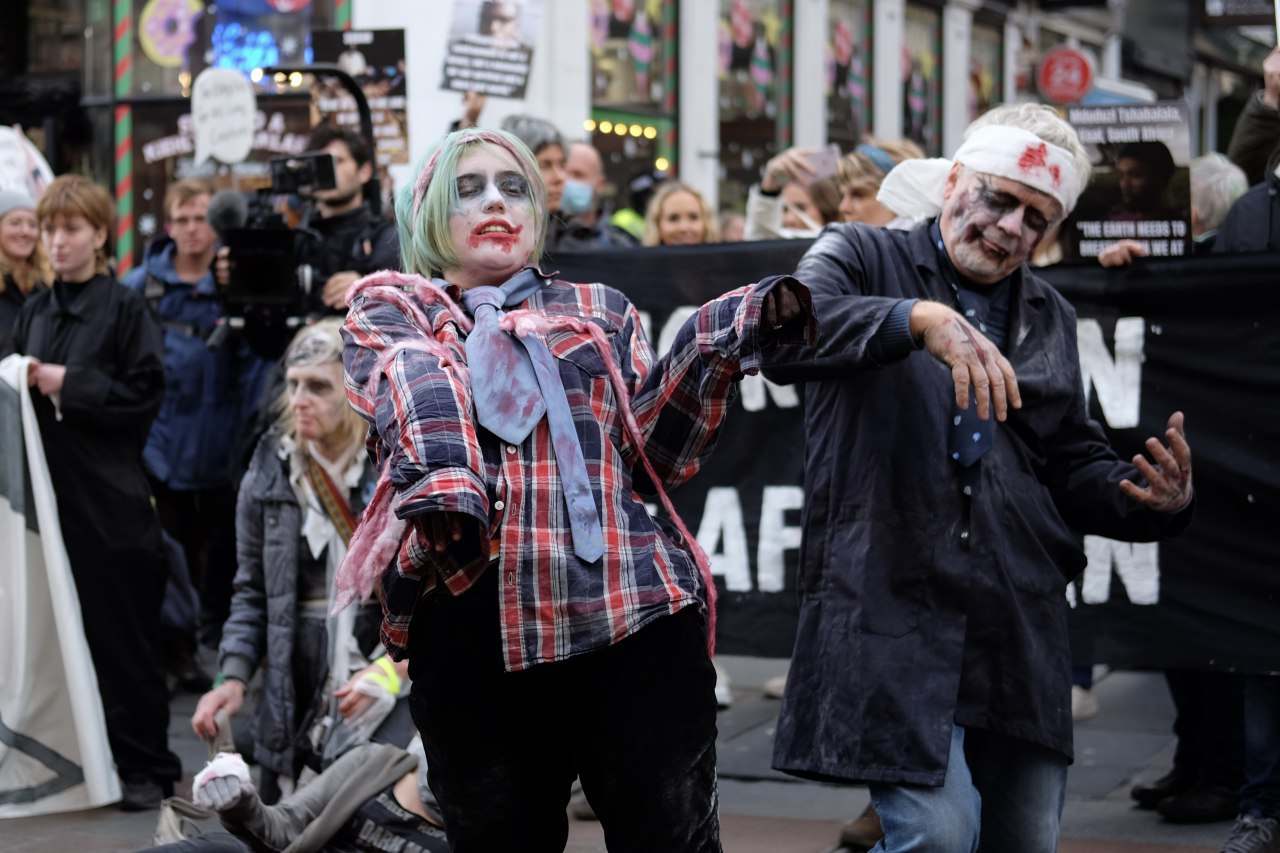
Rebels dance to Killer Driller (based on Thriller) for some undeadly ‘disco-bedience’.
In a day of action that incorporated singing, dancing, marching, and smashing up a car with hammers (it was a performance), activists from across Africa spoke about how Global North-backed oil projects have devastated their nations. Rebels also heard how vital compensation for loss and damage was to the nations already suffering from Global Heating.
Around 150 rebels staged a die-in outside the offices of asset-management firm Mercer, owned by one of the world’s most powerful climate deniers.
And finally a coalition of activists including rebels managed to get inside the COP26 Green Zone and disrupt a panel discussion hosted by National Grid. The group stormed the stage to call out the greenwashing energy company for importing vast amounts of fracked gas.
XR Scotland provided emergency accommodation and held actions outdoors at the last minute after police threats led venues to cancel bookings. Help them recover costs.
Action Roundup
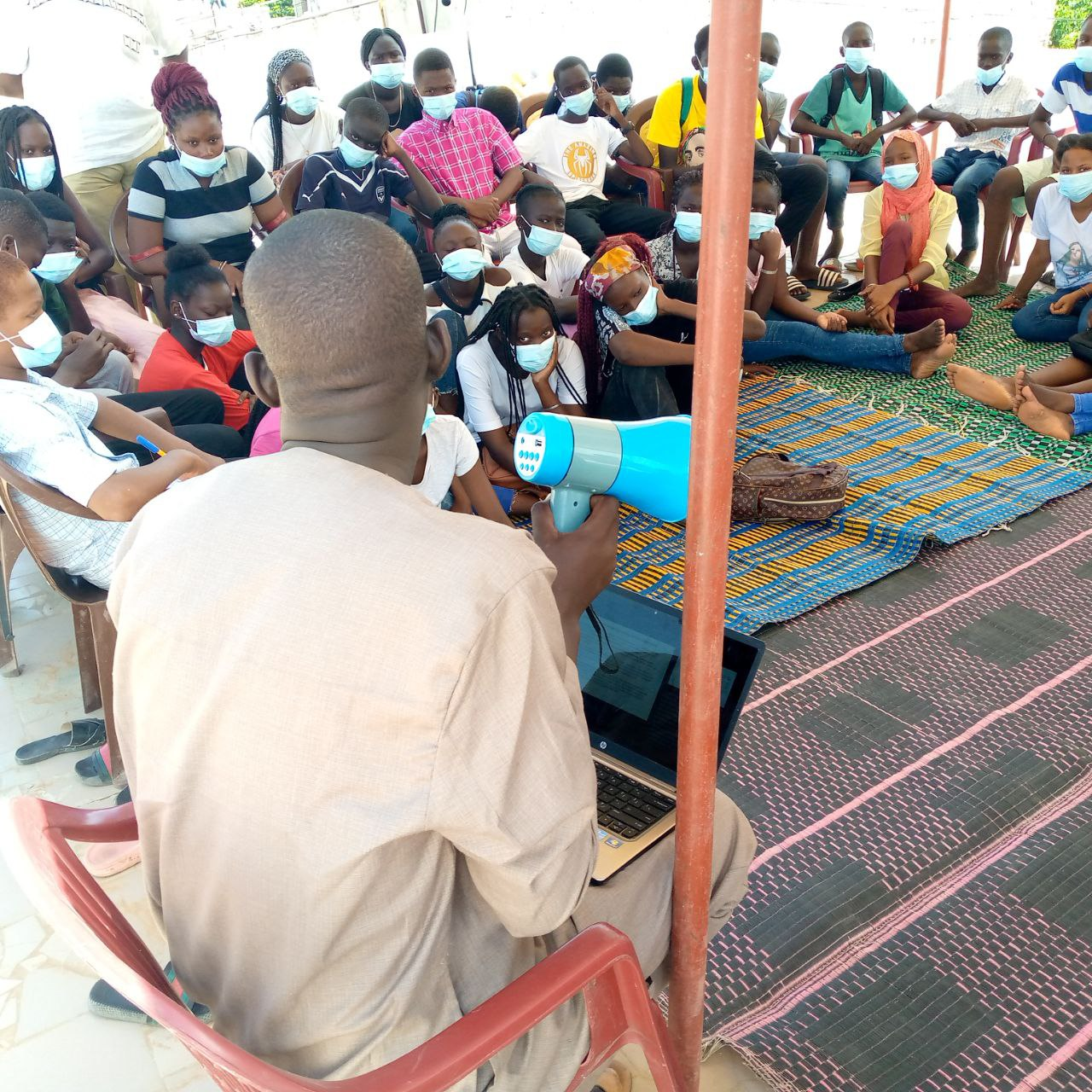
2 NOV | Dakar, Senegal: XR Senegal held a workshop on biodiversity with local school children. The country was once the breadbasket of West Africa, known for its fertile soils and vast forests. But after decades of illegal logging the regional ecology is devastated and food insecurity is becoming a serious crisis.
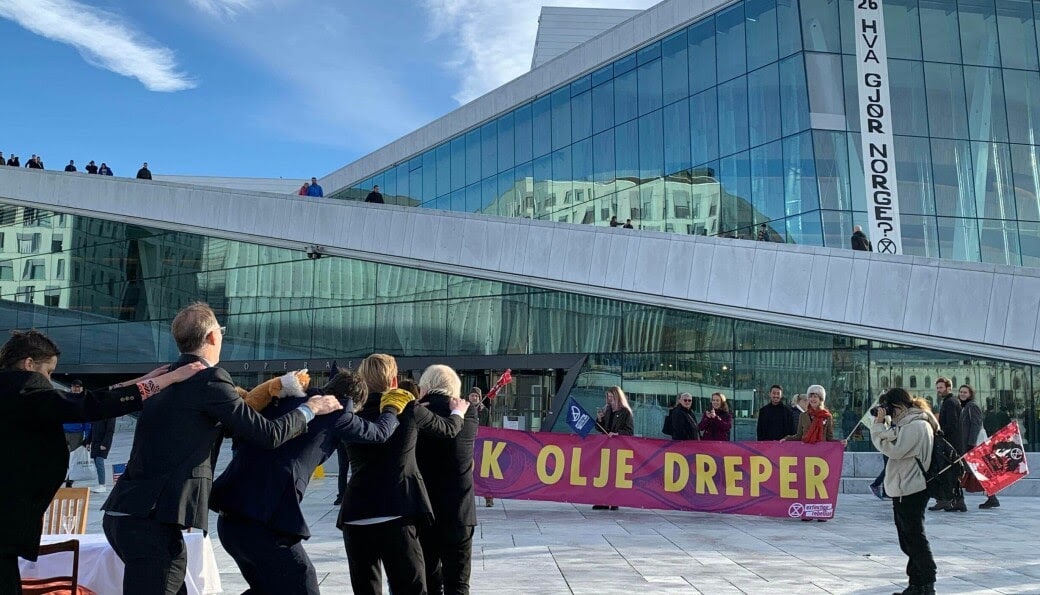
6 NOV | Oslo, Norway: Rebels dressed as delegates play party games rather than agree on a proper climate agreement. Banners unfurled down the opera house as part of the action.
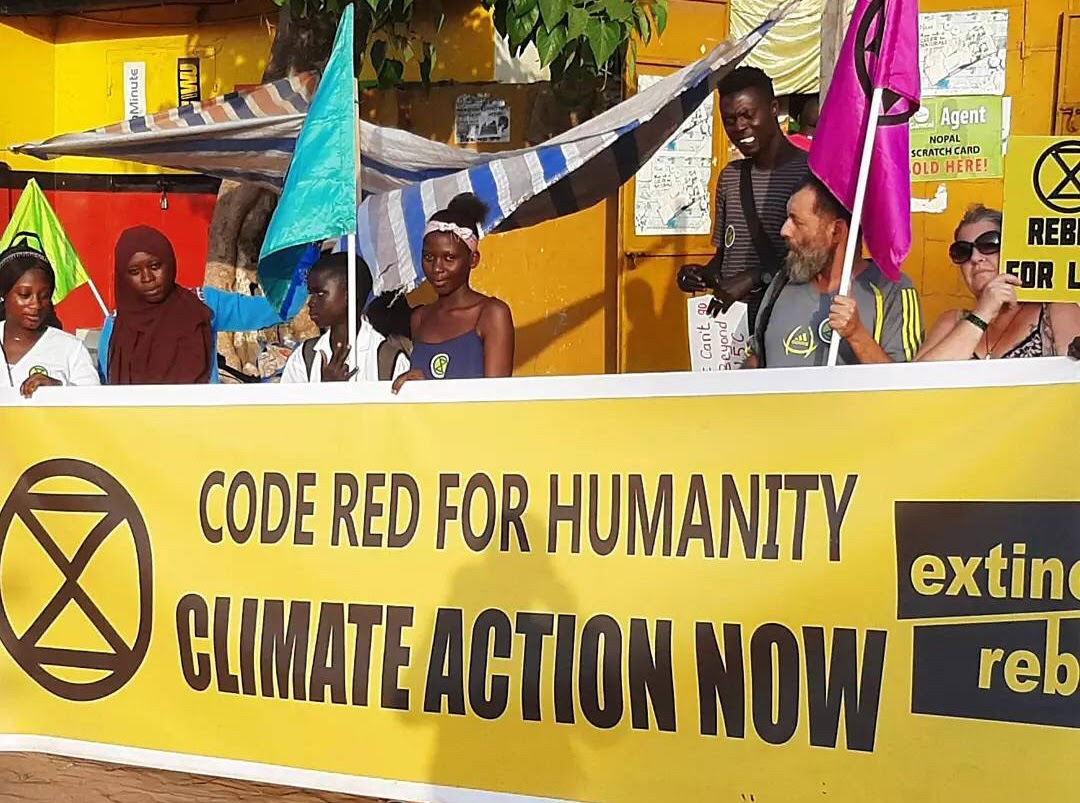
7 NOV | Banjul, Gambia: Rebels call for climate action on the busiest road in the capital.
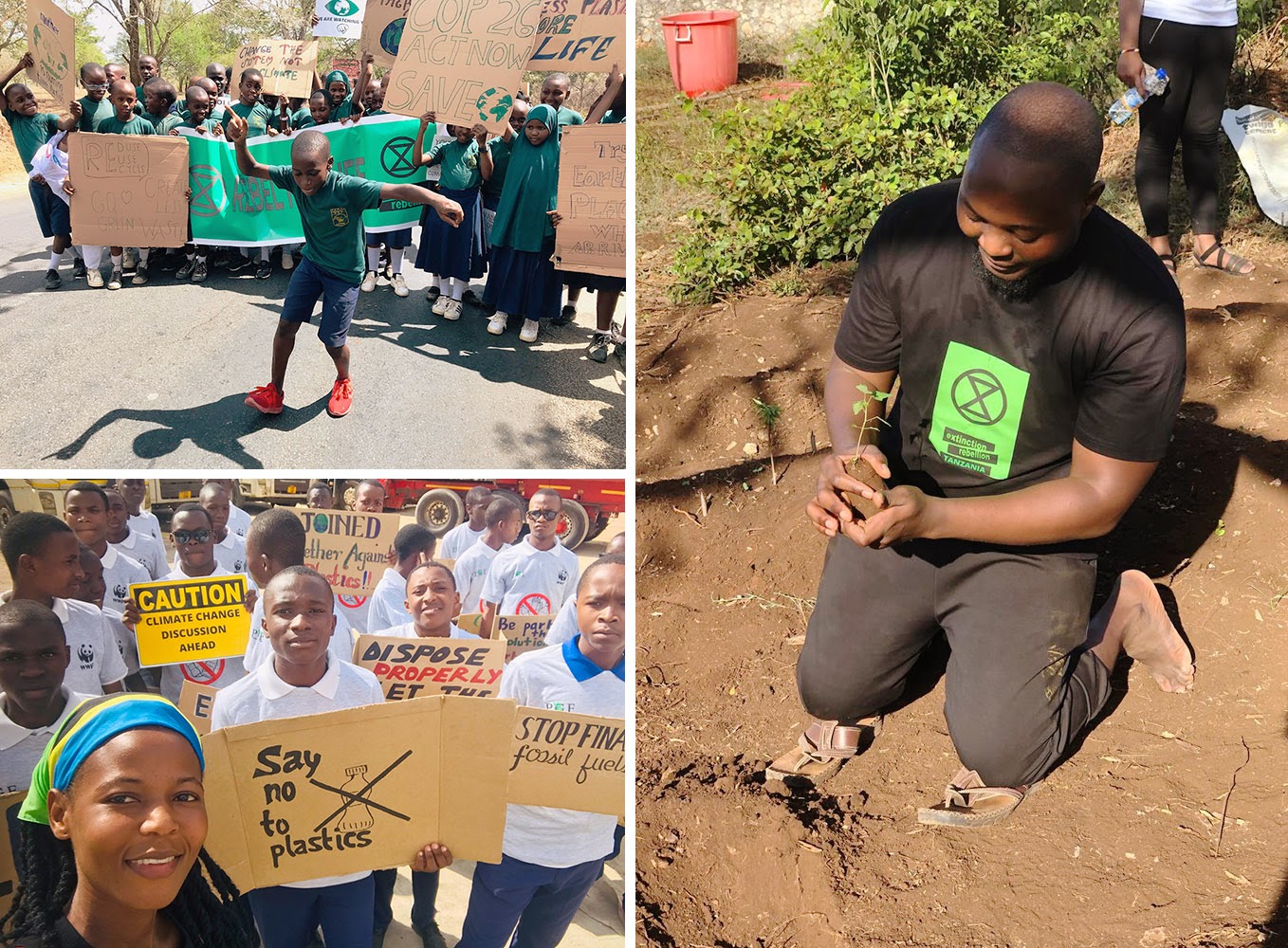
8 / 10 / 12 NOV | Zanzibar / Kibaha / Pwani, Tanzania: XR Tanzania joins with other local groups to plant trees and march with both school children and students.
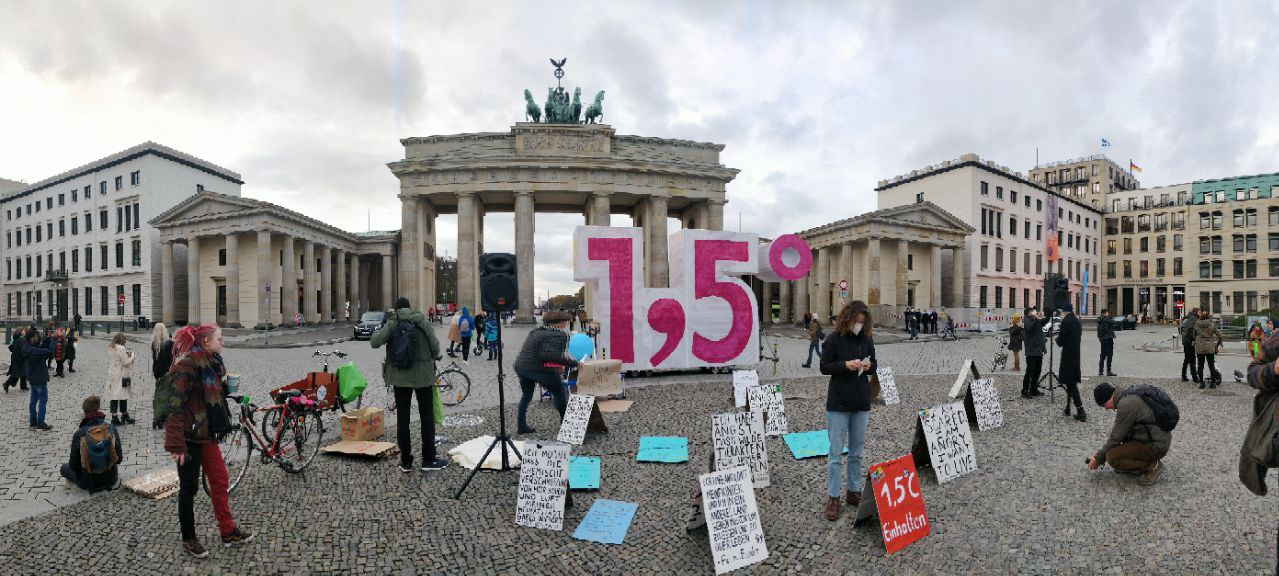
8 NOV | Berlin, Germany: An installation with quotes from people from the global south. Later a die-in was held. In Hamburg, meanwhile, rebels were gluing themselves to roads.
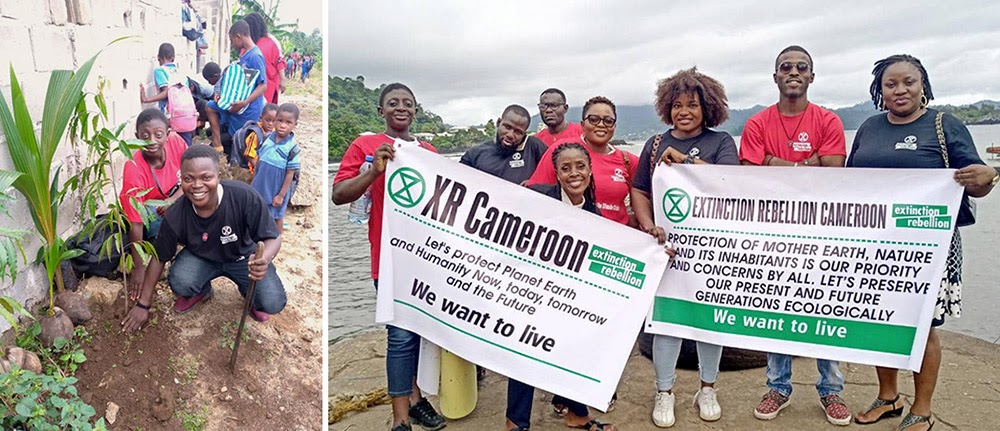
9 / 12 NOV | Limbe, Cameroon: Rebels organise a beach clean up, protest outside three petrol stations, and later plant fruit trees at a primary school.
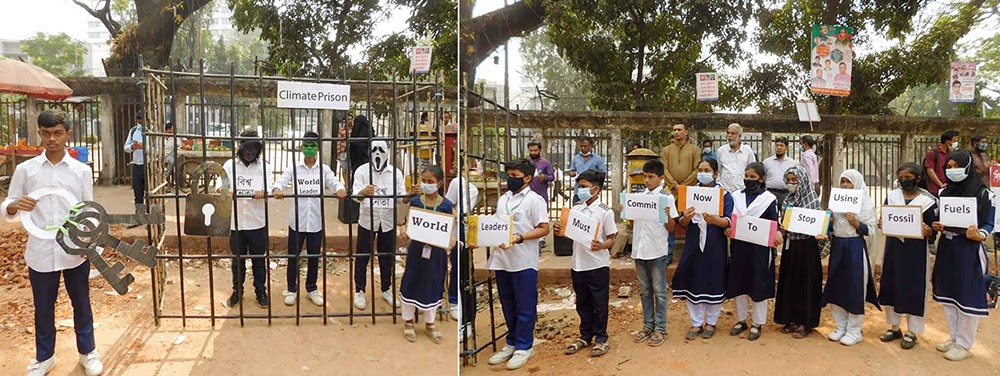
10 NOV | Bangladesh: Young activists from ‘Save Future Bangladesh’ put themselves in a symbolic prison created by the failure of world leaders to end fossil fuel use at COP26.
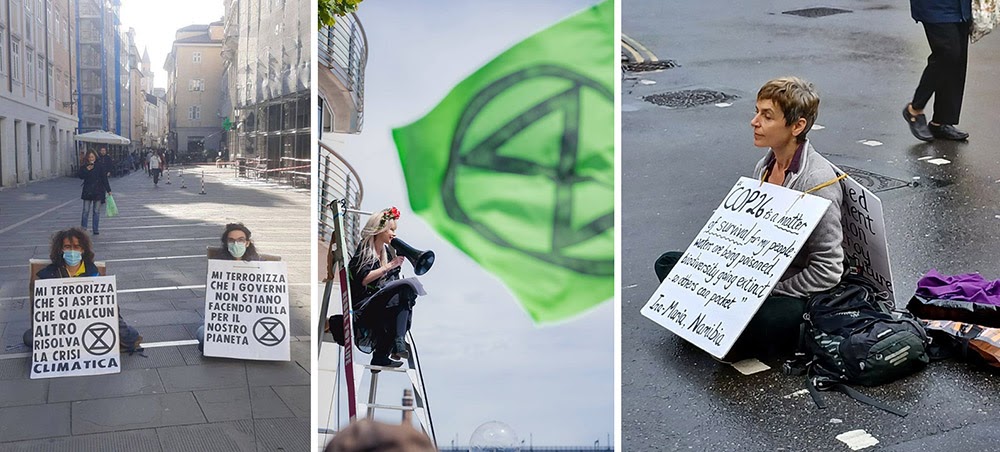
10 NOV | Italy, Australia, UK: Lone rebels blockade streets around the world at 11am as part of a global Rebellion of One.
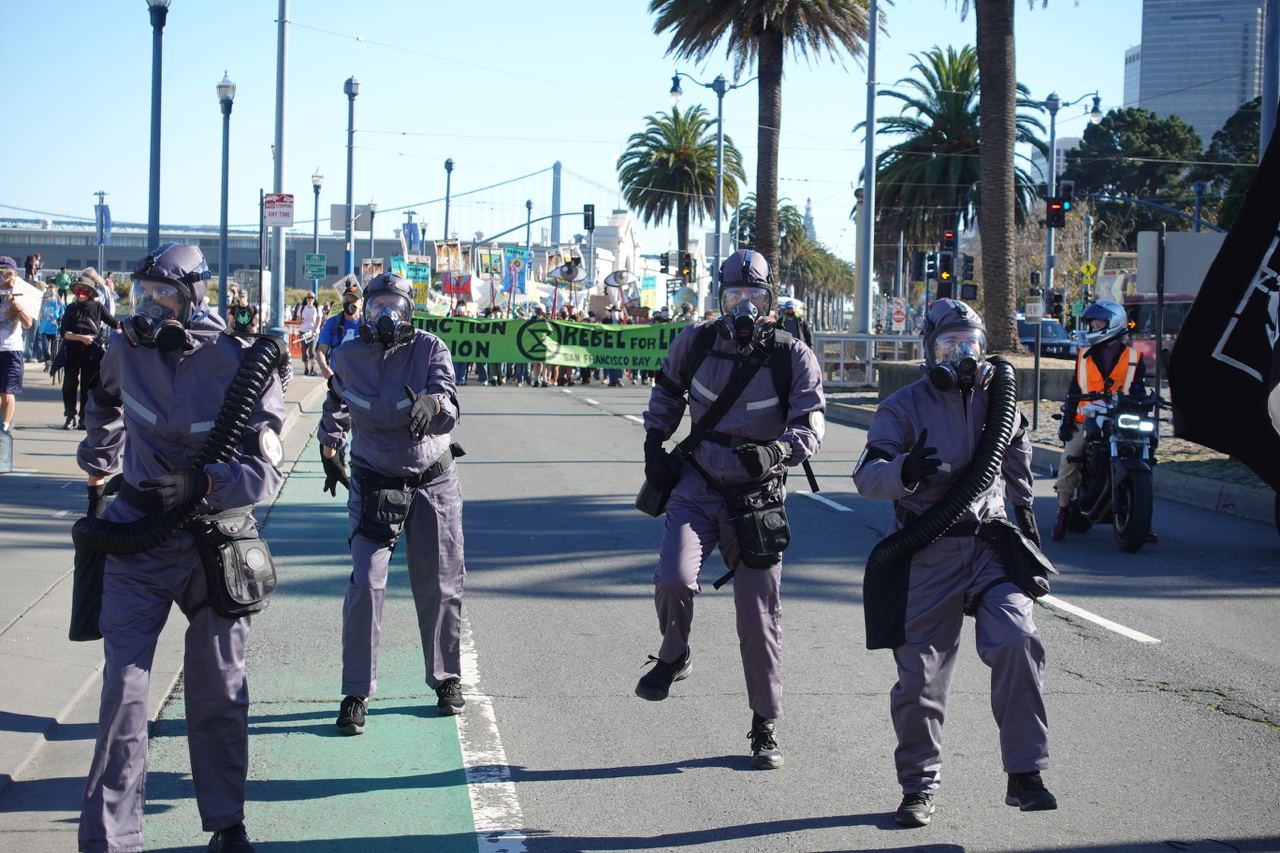
11 NOV | San Francisco Bay, USA: Hundreds of rebels join with other climate justice groups to march through the city. "Xtractors" lead the way - malfunctioning figures who represent the dystopian instability of extractive capitalism. Photo: Lev Schlaffer
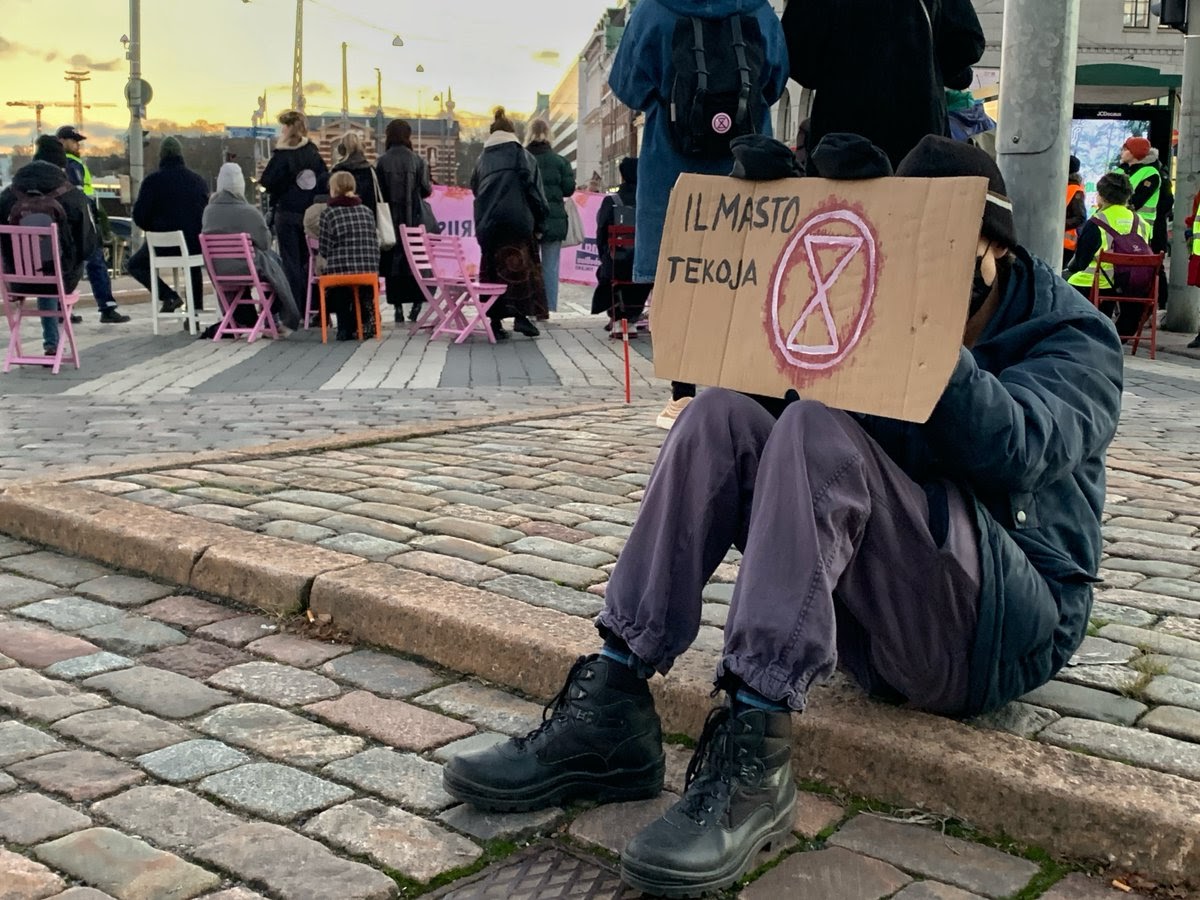
12 NOV | Helsinki, Finland: 65 rebels occupy a central square to protest COP26. After a couple of police warnings to disperse, 15 protesters were arrested and taken away in vans.
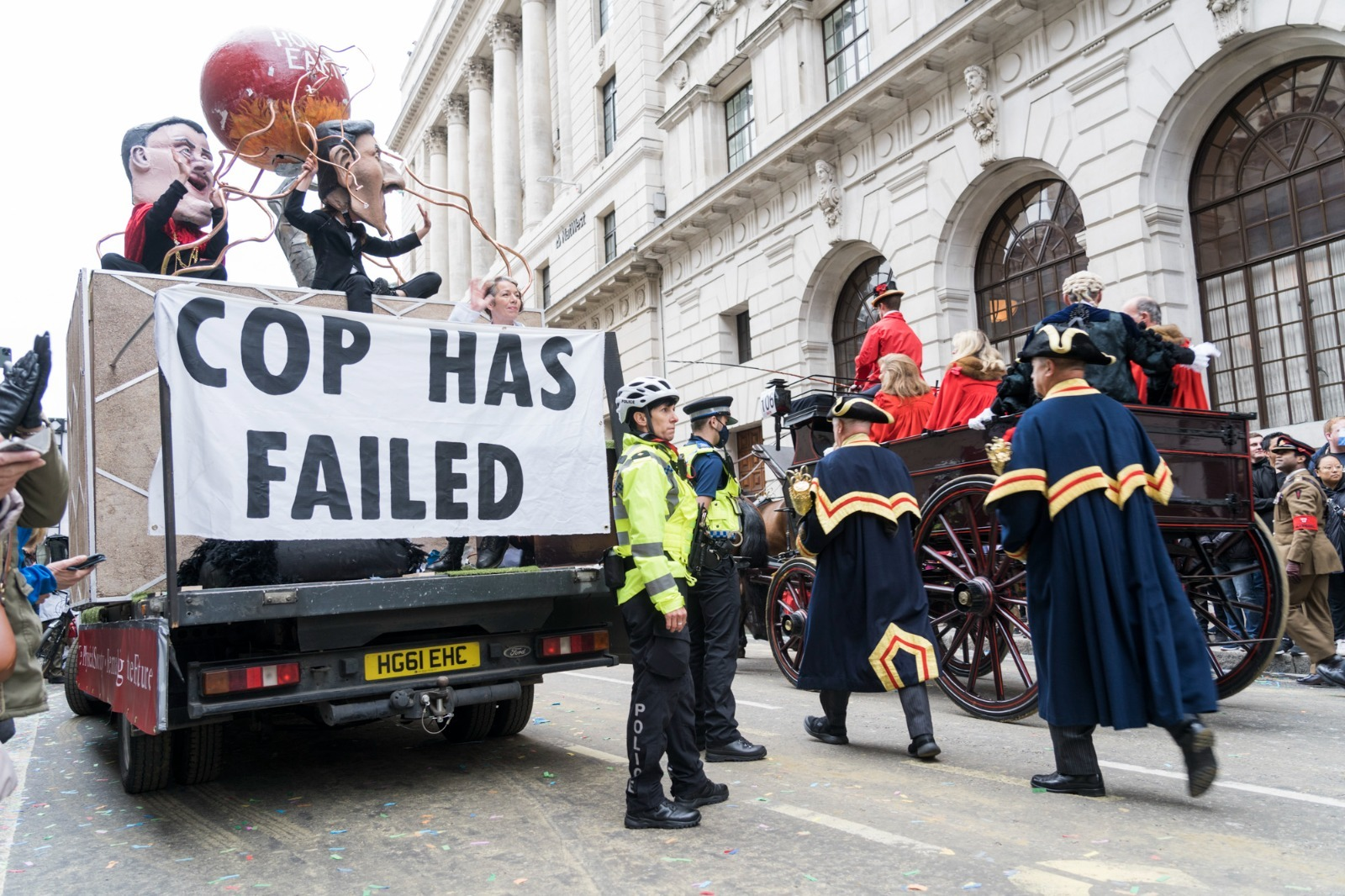
13 NOV | London, UK: Rebels disrupt the Lord Mayor’s parade in the City of London (the heart of UK fossil fuel investment). Police made arrests. Photo: Immo Klink
Humans of XR:
Babu, The Gambia
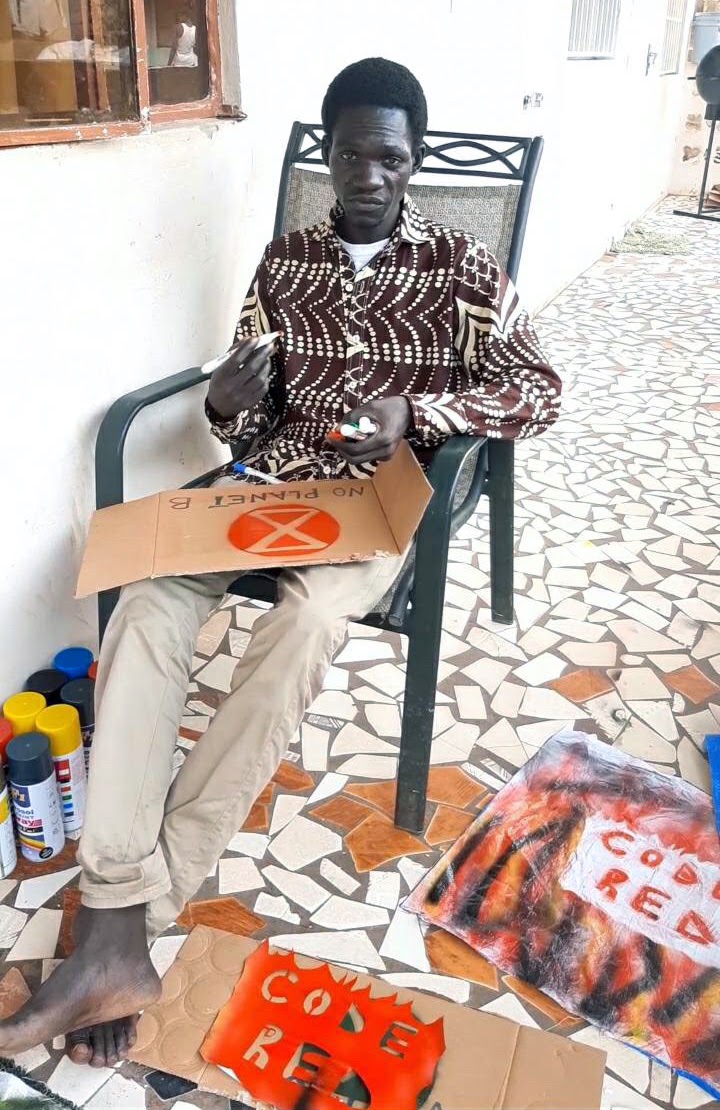
My friends and I were busy with activism in Gambia when we became aware of Extinction Rebellion on social media. I was so interested, I thought it was amazing. As activists we wanted to make things move but it wasn’t happening, so myself and three friends founded XR Gambia in September 2019.
We took many actions - marches, public talks, school and community outreach, street chalkivism, die-ins - and we have grown to 27 rebels. The media does not like to publish the facts but I talk about climate science in schools. As a result of XR Gambia, the young people are becoming more aware of the climate crisis. Sadly, I think there is still a general perception that climate change is just a natural circumstance.
I find comfort in taking part in actions. We go onto the streets and tell the truth to people. Even if we have no funds, we improvise using waste sacks and disposable cartons to make posters.
Rising sea levels, extreme weather events, and increasing temperatures are threatening my country. We have good flora and fauna which continues to be annihilated. It is so clear, so alarming and the science is there to follow. I don’t know why people are not acting.
I think the big corporations are making so much money that they are happy to put profit over planet. They hide the facts as they destroy the future, making everything bad, but I hope things are getting better. I have made many friends as a result of my activism - we are becoming more connected, we share the facts. I believe we can still break through.
I’m a senior school teacher but have gone back to University to study the environment, english language and communication. I secured a scholarship with an environmental body but it didn’t work out, so I am funding myself. I will gather this knowledge so I have more impact. I don’t want to stop campaigning. I will continue. Activism is working - slowly slowly slowly - but it is working.
If you know (or are) a rebel somewhere in the world with a story to tell, get in touch at xr-newsletter@protonmail.com
Thank you
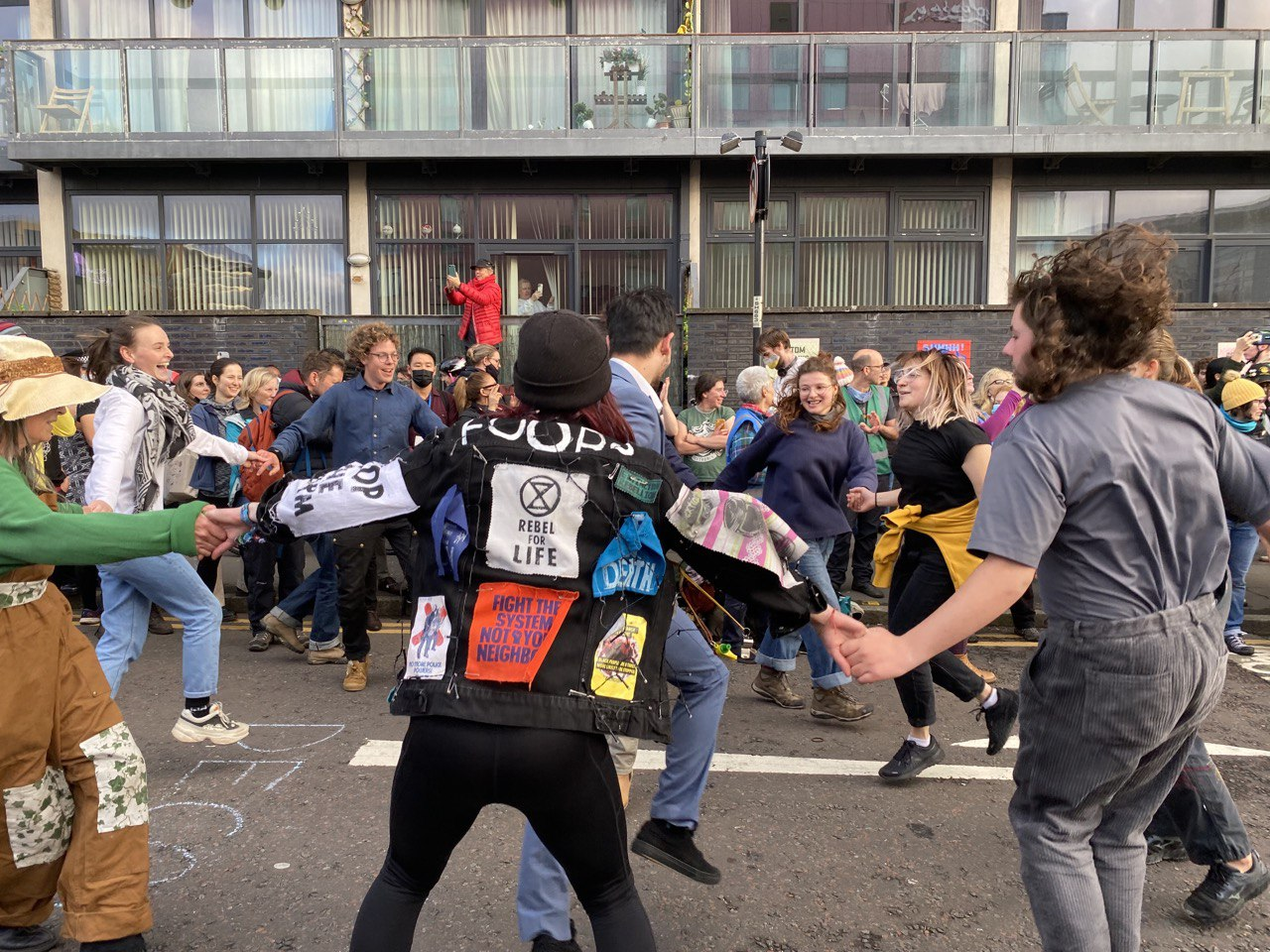
Rebels enjoy a Climate Ceilidh (traditional Scottish dancing) outside COP26. It’s been a rough two weeks, but it’s important we still make time to laugh a little as well as despair.
Thank you for reading, rebel. If you have any questions or feedback, we want to hear from you. Get in touch at xr-newsletter@protonmail.com.
We are in a crucial phase of human history, and our movement needs money to make our message heard. Anything you can give is appreciated.